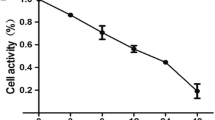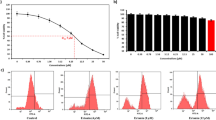Abstract
Esophageal cancer (EC) is a common cancer globally and has a low survival rate because it is often diagnosed at a late-stage, and is frequently chemotherapy resistant. Thymol is found in the herb thyme and has been reported to have potential anticancer properties. We aimed to explore the effects of thymol on the efficacy of 5-Fluorouracil (5-FU) treatment in an in vitro model of EC. We evaluated the synergistic effects of thymol with 5-FU using cell viability, apoptosis, cell cycle analysis, scratch wound healing assay, gelatin zymography, as well as reactive oxygen species (ROS) generation aproaches. The results indicated that thymol significantly decreased the viability of KYSE-30 cells in a time and dose-dependently. However, thymol had a minimal cytotoxic effect against normal fibroblasts. In addition, thymol significantly increased the chemosensitivity of EC KYSE-30 cells to 5-FU by promoting early and late apoptosis, inducing Sub-G1 and G2/M cell cycle arrest, and increasing ROS generation. Combination therapy of thymol with 5-FU also resulted in an increased expression of p53 and Bax, decreased expression of Bcl2, reduced activity of MMP-2, and reduced cell migration compared to single therapies. These findings suggest that thymol has the potential to promote the anticancer potency of 5-FU chemotherapy and inhibit metastasis. However, further studies using animal models are necessary to validate these results.









Similar content being viewed by others
References
Liu CQ, Ma YL, Qin Q, Wang PH, Luo Y, Xu PF, et al. Epidemiology of esophageal cancer in 2020 and projections to 2030 and 2040. Thoracic cancer. 2023;14(1):3–11. https://doi.org/10.1111/1759-7714.14745.
Peery AF, Crockett SD, Barritt AS, Dellon ES, Eluri S, Gangarosa LM, et al. Burden of gastrointestinal, liver, and pancreatic diseases in the United States. Gastroenterology. 2015;149(7):1731-41.e3. https://doi.org/10.1053/j.gastro.2015.08.045.
Watanabe M, Otake R, Kozuki R, Toihata T, Takahashi K, Okamura A, et al. Recent progress in multidisciplinary treatment for patients with esophageal cancer. Surg Today. 2020;50(1):12–20. https://doi.org/10.1007/s00595-019-01878-7.
Waters JK, Reznik SI. Update on management of squamous cell esophageal cancer. Curr Oncol Rep. 2022;24(3):375–85. https://doi.org/10.1007/s11912-021-01153-4.
Longley DB, Harkin DP, Johnston PG. 5-fluorouracil: mechanisms of action and clinical strategies. Nat Rev Cancer. 2003;3(5):330–8. https://doi.org/10.1038/nrc1074.
Ku GY. Systemic therapy for esophageal cancer: chemotherapy. Chin Clin Oncol. 2017;6(5):49. https://doi.org/10.21037/cco.2017.07.06.
Ciardiello D, Martini G, Famiglietti V, Napolitano S, De Falco V, Troiani T, et al. Biomarker-guided anti-egfr rechallenge therapy in metastatic colorectal cancer. Cancers (Basel). 2021. https://doi.org/10.3390/cancers13081941.
Kojima T, Shah MA, Muro K, Francois E, Adenis A, Hsu CH, et al. Randomized phase III KEYNOTE-181 study of pembrolizumab versus chemotherapy in advanced esophageal cancer. J Clin Oncol. 2020;38(35):4138–48. https://doi.org/10.1200/jco.20.01888.
Wang C, Zhou M, Zhu P, Ju C, Sheng J, Du D, et al. IGF2BP2-induced circRUNX1 facilitates the growth and metastasis of esophageal squamous cell carcinoma through miR-449b-5p/FOXP3 axis. J Exp Clin Cancer Res. 2022;41(1):347. https://doi.org/10.1186/s13046-022-02550-8.
Wang Y, Yang W, Wang Q, Zhou Y. Mechanisms of esophageal cancer metastasis and treatment progress. Front Immunol. 2023;14:1206504. https://doi.org/10.3389/fimmu.2023.1206504.
Huang M, Lu JJ, Ding J. Natural products in cancer therapy: past present and future. Nat Prod Bioprospect. 2021;11(1):5–13. https://doi.org/10.1007/s13659-020-00293-7.
Karpanen TJ, Worthington T, Hendry ER, Conway BR, Lambert PA. Antimicrobial efficacy of chlorhexidine digluconate alone and in combination with eucalyptus oil, tea tree oil and thymol against planktonic and biofilm cultures of Staphylococcus epidermidis. J Antimicrob Chemother. 2008;62(5):1031–6. https://doi.org/10.1093/jac/dkn325.
Nagoor Meeran MF, Javed H, Al Taee H, Azimullah S, Ojha SK. Pharmacological properties and molecular mechanisms of thymol: prospects for its therapeutic potential and pharmaceutical development. Front Pharmacol. 2017;8:380. https://doi.org/10.3389/fphar.2017.00380.
Aljelehawy QHA, Mohammadi S, Mohamadian E, RajiMalAllah O, Mirzaei A, Ghahremanlou M. Antimicrobial, anticancer, antidiabetic, antineurodegenerative, and antirheumatic activities of thymol: clarification of mechanisms. Micro Nano Bio Aspects. 2023;2(1):1–7. https://doi.org/10.22034/mnba.2023.381107.1019.
Villanueva A. Hepatocellular carcinoma. N Engl J Med. 2019. https://doi.org/10.1056/NEJMra1713263.
Li Y, Wen JM, Du CJ, Hu SM, Chen JX, Zhang SG, et al. Thymol inhibits bladder cancer cell proliferation via inducing cell cycle arrest and apoptosis. Biochem Biophys Res Commun. 2017;491(2):530–6. https://doi.org/10.1016/j.bbrc.2017.04.009.
De La Chapa JJ, Singha PK, Lee DR, Gonzales CB. Thymol inhibits oral squamous cell carcinoma growth via mitochondria-mediated apoptosis. J Oral Pathol Med. 2018;47(7):674–82. https://doi.org/10.1111/jop.12735.
Chauhan AK, Bahuguna A, Paul S, Kang SC. Thymol elicits HCT-116 colorectal carcinoma cell death through induction of oxidative stress. Anticancer Agents Med Chem. 2018;17(14):1942–50. https://doi.org/10.2174/1871520617666170327121228.
Fekri Kohan S, Zamani H, Salehzadeh A. Antibacterial potential and cytotoxic activity of iron oxide nanoparticles conjugated with thymol (Fe(3)O(4)@Glu-thymol) on breast cancer cells and investigating the expression of BAX, CASP8, and BCL-2 genes. Biometals. 2023;36(6):1273–84. https://doi.org/10.1007/s10534-023-00516-7.
Qoorchi Moheb Seraj F, Heravi-Faz N, Soltani A, Ahmadi SS, Shahbeiki F, Talebpour A, et al. Thymol has anticancer effects in U-87 human malignant glioblastoma cells. Mol Biol Rep. 2022;49(10):9623–32. https://doi.org/10.1007/s11033-022-07867-3.
Martinotti S, Ranzato E. Scratch wound healing assay. Methods Mol Biol. 2020;2109:225–9. https://doi.org/10.1007/7651_2019_259.
Toth M, Fridman R. Assessment of gelatinases (MMP-2 and MMP-9 by gelatin zymography. Methods Mol Med. 2001;57:163–74. https://doi.org/10.1385/1-59259-136-1:163.
Takeuchi H, Miyata H, Gotoh M, Kitagawa Y, Baba H, Kimura W, et al. A risk model for esophagectomy using data of 5354 patients included in a Japanese nationwide web-based database. Ann Surg. 2014;260(2):259–66. https://doi.org/10.1097/sla.0000000000000644.
Mao C, Zeng X, Zhang C, Yang Y, Xiao X, Luan S, et al. Mechanisms of pharmaceutical therapy and drug resistance in esophageal cancer. Front Cell Dev Biol. 2021;9: 612451. https://doi.org/10.3389/fcell.2021.612451.
Talib WH, Alsayed AR, Barakat M, Abu-Taha MI, Mahmod AI. Targeting drug chemo-resistance in cancer using natural products. Biomedicines. 2021;9(10):1353. https://doi.org/10.3390/biomedicines9101353.
Blažíčková M, Blaško J, Kubinec R, Kozics K. Newly synthesized thymol derivative and its effect on colorectal cancer cells. Molecules. 2022. https://doi.org/10.3390/molecules27092622.
Yeh JH, Chou CT, Chen IS, Lu T, Lin KL, Yu CC, et al. Effect of thymol on Ca2+ homeostasis and viability in PC3 human prostate cancer cells. Chin J Physiol. 2017;60(1):32–40. https://doi.org/10.4077/cjp.2017.Baf447.
Dashtaki A, Mahjoub S, Zabihi E, Pourbagher R. The effects of pre-treatment and post-treatment of thymol against tert-butyl hydroperoxide (t-BHP) cytotoxicity in MCF-7 cell line and fibroblast derived foreskin. Rep Biochem Mol Biol. 2020;9(3):338–47. https://doi.org/10.29252/rbmb.9.3.338.
Deb DD, Parimala G, Saravana Devi S, Chakraborty T. Effect of thymol on peripheral blood mononuclear cell PBMC and acute promyelotic cancer cell line HL-60. Chem Biol Interact. 2011;193(1):97–106. https://doi.org/10.1016/j.cbi.2011.05.009.
Ahmed OM, Galaly SR, Mostafa M-AMA, Eed EM, Ali TM, Fahmy AM, et al. Thyme oil and thymol counter doxorubicin-induced hepatotoxicity via modulation of inflammation, apoptosis, and oxidative stress. Oxid Med Cell Longev. 2022;2022:6702773. https://doi.org/10.1155/2022/6702773.
EM E-S, AR A-A, AM M, AA E-A. Thymol and carvacrol prevent cisplatin-induced nephrotoxicity by abrogation of oxidative stress, inflammation, and apoptosis in rats. Oxid Med Cell Longev. 2015;29(4):165–72. https://doi.org/10.1002/jbt.21681.
Vadlapatla RK, Vadlapudi AD, Pal D, Mitra AK. Mechanisms of drug resistance in cancer chemotherapy: coordinated role and regulation of efflux transporters and metabolizing enzymes. Curr Pharm Des. 2013;19(40):7126–40. https://doi.org/10.2174/13816128113199990493.
Elbe H, Yigitturk G, Cavusoglu T, Uyanikgil Y, Ozturk F. Apoptotic effects of thymol, a novel monoterpene phenol, on different types of cancer. Bratisl Lek Listy. 2020;121(2):122–8. https://doi.org/10.4149/bll_2020_016.
Balan DJ, Rajavel T, Das M, Sathya S, Jeyakumar M, Devi KP. Thymol induces mitochondrial pathway-mediated apoptosis via ROS generation, macromolecular damage and SOD diminution in A549 cells. Pharmacol Rep. 2021;73(1):240–54. https://doi.org/10.1007/s43440-020-00171-6.
Lohan-Codeço M, Barambo-Wagner ML, Nasciutti LE, Ribeiro Pinto LF, Meireles Da Costa N, Palumbo A Jr. Molecular mechanisms associated with chemoresistance in esophageal cancer. Cell Mol Life Sci. 2022;79(2):116. https://doi.org/10.1007/s00018-022-04131-6.
Warren CFA, Wong-Brown MW, Bowden NA. BCL-2 family isoforms in apoptosis and cancer. Cell Death Dis. 2019;10(3):177. https://doi.org/10.1038/s41419-019-1407-6.
Sjöström J, Blomqvist C, von Boguslawski K, Bengtsson NO, Mjaaland I, Malmström P, et al. The predictive value of bcl-2, bax, bcl-xL, bag-1, fas, and fasL for chemotherapy response in advanced breast cancer. Clin Cancer Res. 2002;8(3):811–6.
NavaneethaKrishnan S, Rosales JL, Lee KY. ROS-mediated cancer cell killing through dietary phytochemicals. Oxid Med Cell Longev. 2019;2019:9051542. https://doi.org/10.1155/2019/9051542.
Pan X, Zhang X, Sun H, Zhang J, Yan M, Zhang H. Autophagy inhibition promotes 5-fluorouraci-induced apoptosis by stimulating ROS formation in human non-small cell lung cancer A549 cells. PLoS ONE. 2013;8(2): e56679. https://doi.org/10.1371/journal.pone.0056679.
Amani M, Najafzadeh N. All-trans retinoic acid combination with cisplatin and 5-fluorouracil promote cytotoxic effect on AGS and KYSE-30 cell lines. J Adv Med Med Res. 2015;23(97):21–33.
Jing SW, Zhai C, Zhang W, He M, Liu QY, Yao JF, et al. Comparison of neoadjuvant immunotherapy plus chemotherapy versus chemotherapy alone for patients with locally advanced esophageal squamous cell carcinoma: a propensity score matching. Front Immunol. 2022;13: 970534. https://doi.org/10.3389/fimmu.2022.970534.
Makino T, Yamasaki M, Tanaka K, Yamashita K, Urakawa S, Ishida T, et al. Multicenter randomised trial of two versus three courses of preoperative cisplatin and fluorouracil plus docetaxel for locally advanced oesophageal squamous cell carcinoma. Br J Cancer. 2022;126(11):1555–62. https://doi.org/10.1038/s41416-022-01726-5.
Samantaray S, Sharma R, Chattopadhyaya TK, Gupta SD, Ralhan R. Increased expression of MMP-2 and MMP-9 in esophageal squamous cell carcinoma. J Cancer Res Clin Oncol. 2004;130(1):37–44. https://doi.org/10.1007/s00432-003-0500-4.
Zeng Q, Che Y, Zhang Y, Chen M, Guo Q, Zhang W. Thymol isolated from Thymus vulgaris L. inhibits colorectal cancer cell growth and metastasis by suppressing the Wnt/β-catenin pathway. Drug Des Devel Ther. 2020;14:2535–47. https://doi.org/10.2147/dddt.S254218.
Lv R, Chen Z. Thymol inhibits cell migration and invasion by downregulating the activation of PI3K/AKT and ERK pathways in human colon cancer cells. Trop J Pharm Res. 2017;16(12):2895–901.
Lee KP, Kim JE, Park WH, Hong H. Regulation of C6 glioma cell migration by thymol. Oncol Lett. 2016;11(4):2619–24. https://doi.org/10.3892/ol.2016.4237.
Acknowledgements
We appreciate the assistance of the Clinical Research Development Unit of Akbar Hospital, Mashhad in conducting this research.We also would like to thank the Clinical Research Development Unit, Imam Reza Hospital, Mashhad University of Medical Sciences, for their assistance in this manuscript.
Funding
This study is supported by Mashhad University of Medical Sciences, Mashhad, Iran (grant code: 4021071).
Author information
Authors and Affiliations
Contributions
A.B, G.P, N.A, Y.M, A.Kh, F.A-M, and F.Q.M.S: Methodology, Investigation, Formal analysis, Conceptualization, Writing—Original Draft. G.A.F and A.B: Supervision, Funding acquisition, Validation, Resources, Project administration, Writing—Review & Editing.
Corresponding author
Ethics declarations
Conflict of Interest
None.
Additional information
Publisher's Note
Springer Nature remains neutral with regard to jurisdictional claims in published maps and institutional affiliations.
Rights and permissions
Springer Nature or its licensor (e.g. a society or other partner) holds exclusive rights to this article under a publishing agreement with the author(s) or other rightsholder(s); author self-archiving of the accepted manuscript version of this article is solely governed by the terms of such publishing agreement and applicable law.
About this article
Cite this article
Pouyamanesh, G., Ameli, N., Metanat, Y. et al. Thymol Enhances 5-Fluorouracil Cytotoxicity by Reducing Migration and Increasing Apoptosis and Cell Cycle Arrest in Esophageal Cancer Cells: An In-vitro Study. Ind J Clin Biochem (2024). https://doi.org/10.1007/s12291-024-01219-7
Received:
Accepted:
Published:
DOI: https://doi.org/10.1007/s12291-024-01219-7




